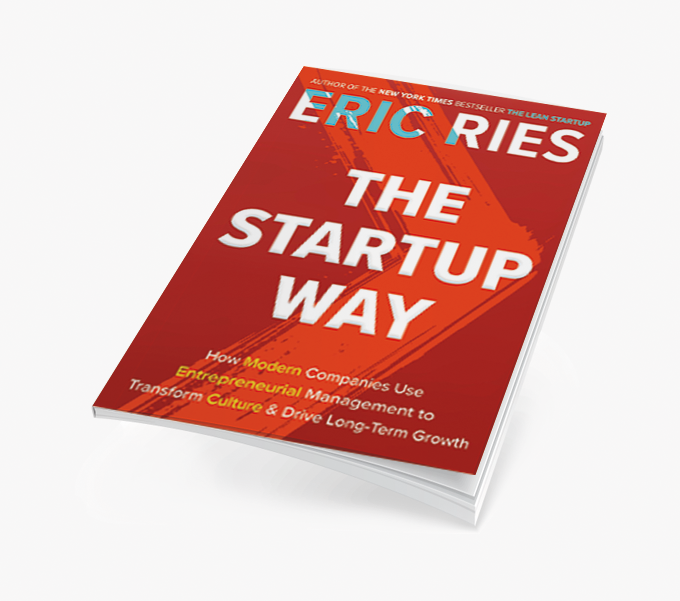


from Eric Ries
In "The Startup Way," Eric Ries revolutionizes business strategy with his Lean Startup methodology applied to Corporations. This insightful guide illuminates entrepreneurial management, emphasizing innovation, MVPs, and iterative design for Business Transformation and Intrapreneurship. It's a beacon for leadership in transforming organizations, advocating a startup mindset, continuous improvement, and disruptive design, crucial for scaling businesses, and fostering an innovation culture.
"Hypergrowth for a company also requires hypergrowth of the people inside it." Eric Ries. The Startup Way.
BRIEF BOOK SUMMARY
"The Startup Way" by Eric Ries is a groundbreaking book that extends the principles of the Lean Startup methodology to larger, established organizations. Ries argues that the agility, rapid innovation, and customer-centric approaches that define startups are equally crucial for larger companies in an ever-evolving business landscape. The book begins by introducing the concept of entrepreneurial management, which challenges traditional corporate practices by advocating for a culture that embraces uncertainty and values continuous innovation. Ries emphasizes the importance of creating minimum viable products (MVPs) and utilizing the build-measure-learn feedback loop to test and refine ideas with real customer feedback, thus reducing risks and costs associated with product development.
Ries delves into the practical application of these startup principles in various organizational contexts, including multinational corporations and non-profits. He provides insightful case studies from companies like GE, Toyota, and Amazon, demonstrating how these organizations have successfully fostered internal innovation and empowered their employees to think and act entrepreneurially. These examples illustrate the transformative power of adopting a startup mindset within traditional corporate structures, leading to increased innovation, faster product development cycles, and a more engaged workforce. However, Ries acknowledges the challenges in implementing this approach, such as overcoming resistance to change and aligning new initiatives with existing business models. He offers strategic insights into navigating these challenges and underscores the importance of leadership commitment and clear communication in driving organizational change.
One of the book's critical contributions is the concept of innovation accounting, a novel approach to measuring progress in uncertain environments. Traditional metrics often fall short in capturing the essence of entrepreneurial progress, so Ries introduces new metrics that offer more meaningful insights into the innovation process. These metrics help businesses evaluate the effectiveness of their new ventures, make informed decisions, and pivot strategies as needed. Additionally, Ries discusses the creation of an entrepreneurial ecosystem within organizations, highlighting the need for fostering interdepartmental collaborations, encouraging cross-functional teams, and building a network of internal and external stakeholders committed to the company’s innovative endeavors.
Ries also addresses the challenges of scaling and sustaining innovation in large organizations. He outlines strategies for maintaining the momentum of innovation initiatives as they grow, such as establishing processes for scaling up successful experiments and embedding a systematic approach to innovation within the organization's structure and processes. The book concludes with a vision for the future of startup methodologies in the business world, emphasizing the importance of staying agile, responsive to customer needs, and open to continuous learning as the keys to long-term success in a rapidly changing business landscape.
"The Startup Way" is not just a set of principles but a call to action for businesses to continually evolve and innovate. Ries's book is a roadmap for companies looking to embed these practices into their DNA, transforming themselves into entities capable of continual reinvention and growth. It is an essential read for business leaders, entrepreneurs, and anyone interested in understanding how the principles that drive startup success can be applied to any organization, regardless of its size or industry.
WHY SHOULD YOU READ THIS BOOK? By Francisco Santolo
Exponential technologies, the reduction of marginal production costs, the ease of outsourcing, advances in communications and new sales channels, the burden of operating costs and the inflexibility of companies, and the power and dissemination of new business methodologies accelerate disruptive innovation, putting current corporations at risk and enabling the emergence of successful new entrepreneurs.
In The Lean Startup Way, Eric Ries answers the question "Can the same entrepreneurial tools (specifically Lean Startup) be successfully applied in corporations and medium-sized businesses?" and defends their effectiveness, delving into the how, presenting arguments, best practices, and his experience on the matter.
I am personally convinced that the new entrepreneurial methodologies represent a radical change in the way of doing business at all company levels. I use them daily to train professionals and entrepreneurs, teach in Bachelor's and MBA programs, and apply them as a consultant in business transformation for large companies, as a member of boards, and as an entrepreneur. It is not about a technical change but about breaking down long-held fundamental paradigms that are still taught and practiced.
The rigid long-term plan is dead. Business plans are dead. The "plan, get money, execute, and see what happens" approach is dead. Not placing the customer and stakeholders at the center is numbered. Corporations designed for the repetition and scalability of existing business models to mass markets are in check and are in the process of reinvention.
The programs of the world's best universities are strongly outdated, and education is undergoing a difficult process of change.
On the other hand, we have the best resources available to learn at every moment. As we hold in Scalabl, today more than ever, "An entrepreneur who does not read is at a tremendous disadvantage." Enjoy the reading.
Francisco Santolo
RELATED BOOKS WE RECOMMEND
"The Lean Startup" by Eric Ries
Provides foundational knowledge of the Lean Startup methodology, crucial for understanding the transformation strategies in "The Startup Way." It focuses on agility, validated learning, and rapid iteration in product development.
"Escape Velocity: Free Your Company's Future from the Pull of the Past" by Geoffrey A. Moore
Complements "The Startup Way" by addressing how established companies can innovate and move beyond past successes. Moore's insights align with Ries's emphasis on innovation and adaptability in large organizations.
"Great by Choice: Uncertainty, Chaos, and Luck--Why Some Thrive Despite Them All" by Jim Collins and Morten T. Hansen This book explores how companies can achieve success in unpredictable and turbulent environments. It aligns with "The Startup Way" in its focus on how companies can strategically navigate uncertainty and chaos, a theme central to Ries's work.







